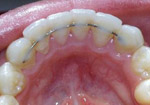Types of Appliances
Types of Braces
| Types of Appliances
Testimonials/Online Reviews

Elastics (Rubber Bands)
Wearing elastics (or rubber bands) improves the fit of your upper and lower teeth. Wear rubber bands as instructed and remember that the rubber bands work far more efficiently if they're worn as prescribed.

Herbst® Appliance
The Herbst® appliance reduces overbite by encouraging the lower jaw forward and the upper molars backward. This fixed appliance is used mostly for younger, growing children and is worn for about 12-15 months.

Palatal Expander
The palatal expander "expands" (or widens) your upper jaw by putting gentle pressure on your upper molars each time an adjustment is made. Your orthodontist will instruct you about when and how to adjust your expander. When you achieve the desired expansion, you will wear the appliance for several months to solidify the expansion and to prevent regression.

Forsus
Positioners complete the final tooth movements in your orthodontic treatment. With your full cooperation, you should only need to wear the positioner appliance for 6-8 weeks.

Retainers
Retainers may be removable or fixed. They hold your teeth in their new, correct positions after your teeth have been straightened. Your orthodontist will instruct you on how to care for your retainer and about the duration of the wear. Wearing your retainer as directed is crucial to prevent regression of your treatment.

Separators or Spacers
Separators are little rubber doughnuts that may be placed between your teeth to push them apart so that orthodontic bands may be placed during your next appointment. The separators will be removed before we place the bands. Separators do not mix well with sticky foods, toothpicks, or floss.

Permanent Fixed Retainers
An entirely different category of orthodontic retainers are fixed retainers. A fixed retainer typically consists of a passive wire bonded to the tongue-side of the (usually, depending on the patient's bite, only lower) incisors. Fixed retainers cannot be removed by the patient. Some doctors prescribe fixed retainers regularly, especially where active orthodontic treatments have affected great changes in the bite and there might a high risk for reversal of these changes.



